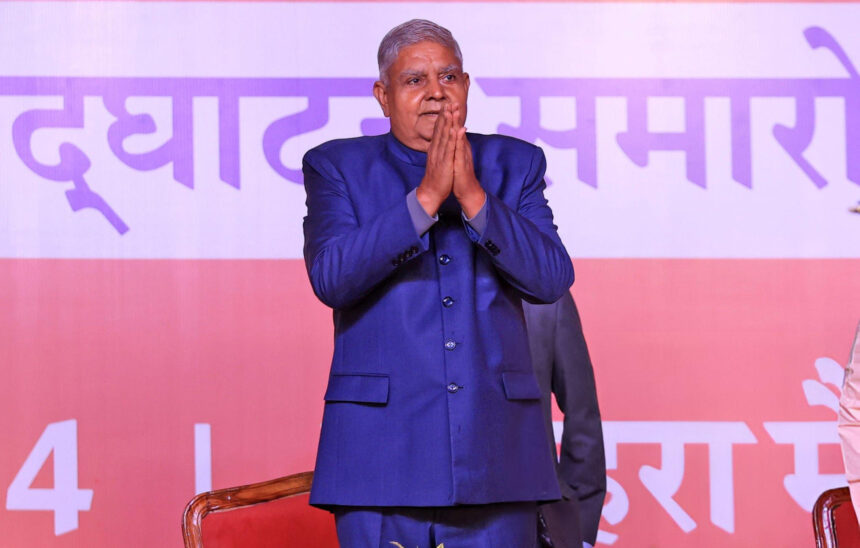Introduction
In a move that has stunned both political corridors and citizens alike, Vice President Jagdeep Dhankhar tendered his resignation late Monday evening, citing health concerns. The announcement came shortly after what many are calling one of the most politically charged days in the Rajya Sabha during the current term. As Dhankhar stepped down from one of the highest constitutional offices of India, speculations about timing, intent, and hidden dynamics have taken centre stage.
A Resignation That Came Without Warning
Vice President Dhankhar, 74, submitted his resignation to President Droupadi Murmu with immediate effect. His letter read:
“To prioritise health care and abide by medical advice, I hereby resign as the Vice President of India, effective immediately.”
The resignation comes just months after he underwent angioplasty at the All India Institute of Medical Sciences (AIIMS), Delhi — a detail that many now retrospectively view as a precursor. However, up until his resignation, Mr. Dhankhar appeared publicly active, engaging in parliamentary responsibilities and preparing for official visits.
A Turbulent Day in the Rajya Sabha
Earlier the same day, Dhankhar presided over what turned out to be a significant and eventful opening of the Monsoon Session of Parliament.
Here’s what unfolded:
- Oath Ceremony: The Vice President administered oaths to newly elected and nominated Rajya Sabha members.
- Business Advisory Committee Meeting: He chaired the session that finalised key legislative agendas.
- Judicial Removal Motion: Perhaps the most politically sensitive development — he received and mentioned a motion for removal proceedings against Justice Yashwant Varma, over allegations tied to unexplained wads of cash found at his residence.
The latter incident raised eyebrows across party lines. While the opposition submitted the motion in the Upper House, it was reportedly in sync with a similar move by the ruling coalition in the Lok Sabha — hinting at an unusually coordinated inter-party consensus.
Planned Engagements Abruptly Cancelled
A government statement released at 3:53 PM on Monday had detailed Dhankhar’s official visit to Jaipur, scheduled for July 23, where he was expected to meet the newly elected members of CREDAI Rajasthan.
However, within hours of that statement, he stepped down from office, calling off the planned engagement entirely.
Political Reaction and Speculation
The resignation has triggered a wave of political reactions, especially from the Congress party, which called the move “totally unexpected” and hinted that “there is far more to it than meets the eye.”
Given the Vice President’s recent public statements — notably one at Jawaharlal Nehru University earlier this month, where he had said, “I will retire at the right time, August 2027, subject to divine intervention,” — many now question the sudden timing. Is it merely a health-based decision? Or is there a deeper political reconfiguration in the works?
A Career Marked by Outspokenness
Jagdeep Dhankhar’s tenure has not been devoid of controversy. Known for his sharp criticisms of the judiciary and his confrontations with the Opposition in Parliament, Dhankhar was seen as one of the most vocal Vice Presidents in recent decades.
Before becoming Vice President in August 2022, he served as Governor of West Bengal (2019–2022), where he frequently locked horns with Chief Minister Mamata Banerjee’s government, especially over issues of federalism, law and order, and institutional autonomy.
Historical Context: Not the First to Resign, But a Rare Exit
Mr. Dhankhar becomes only the third Vice President in Indian history to resign before completing a full term — the others being:
- V.V. Giri, who resigned in 1969 to contest the presidential election.
- R. Venkataraman, who stepped down in 1984, also to contest the presidency.
In both those cases, resignation was a step up. In Dhankhar’s case, the opposite seems true — a retreat from public office, citing personal health over political ambition.
What Happens Next?
As per constitutional provisions:
- A new Vice President must be elected within six months.
- Until then, the Deputy Chairman of the Rajya Sabha will preside over proceedings in the Upper House.
Sources within the Election Commission suggest that preparations for the election may begin as early as next month, with candidates likely being fielded by both the BJP-led NDA and the INDIA alliance.
Final Reflections
Mr. Dhankhar’s parting message was reflective and somewhat emotional: “It has been a privilege and satisfaction to witness and partake in India’s remarkable economic progress and unprecedented exponential development during this significant period. Serving in this transformative era of our nation’s history has been a true honour.” Whether his exit truly stems from personal health concerns or hints at something larger unfolding in Delhi’s political theatre, one thing is clear: Jagdeep Dhankhar’s departure leaves a vacuum not just in the Rajya Sabha, but in India’s current constitutional narrative.










